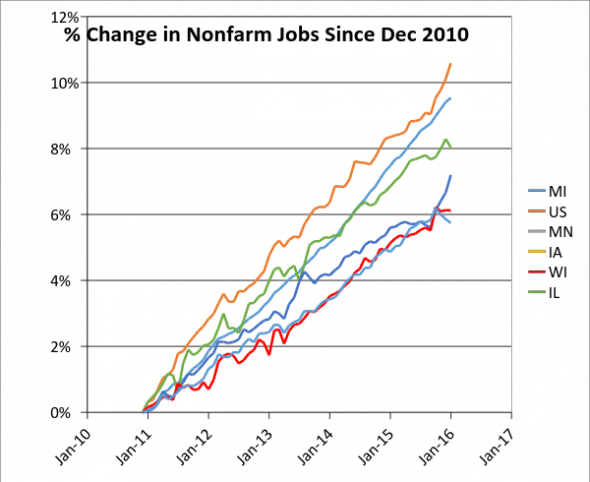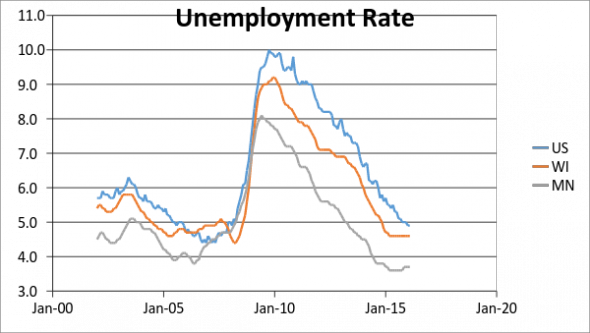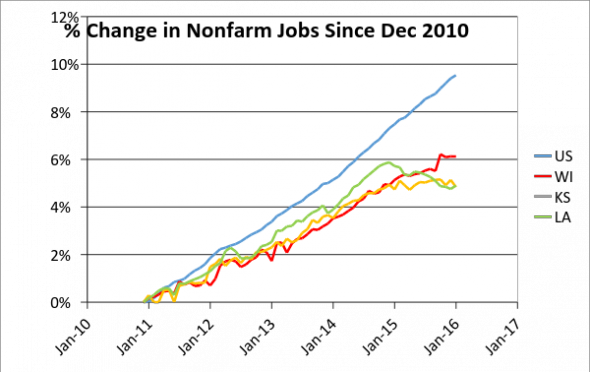Road Map To Economic Failure
Why has Walker’s jobs plan failed? And why won’t he change his approach?
By this time, it should be evident that Gov. Scott Walker’s job-creating plan has failed. So why does an approach with so little success or supporting evidence for it continue to be followed by Walker and other conservative leaders?
Wisconsin continues to lag behind most of its neighboring states and the nation in job creation. The graph to the right shows percentage growth since the end of 2011 in Wisconsin and states bordering us. While Wisconsin has added jobs since the Great Recession, it has done so at about half the rate promised by candidate Walker in 2010.
Wisconsin’s only competitor for the bottom of the list is Illinois. Illinois has struggled with the worst-funded public employee pension system in the nation. Finding a solution has become nearly impossible because of an impasse between its Republican governor and Democratic legislature. By contrast, Wisconsin’s public pension system has long been among the best-funded in the nation.
One point of pride has been Wisconsin’s unemployment rate which came through the recession about one percentage point below the national average. As can be seen in the next graph, that advantage has been shrinking as other states’ unemployment has been dropping more rapidly than Wisconsin’s.
Despite the lagging performance, there’s no sign that either the governor or the legislature are bringing fresh thinking to Wisconsin’s economic challenges. Instead Wisconsin continues to follow what has become the orthodox GOP economic prescription for prosperity.
This prescription is detailed in Rich States Poor States, put out by the American Legislative Exchange Council. The latest edition, published in early 2016 and using 2015 data, places Wisconsin at 13th best among the states in its “Outlook” rating, based on the state’s economic policies. These policies are heavily skewed towards redistributing income from those at the bottom of the economic ladder to those at the top. For instance, it gives states high marks for regressive income taxes—and the best marks for no income taxes, for low top marginal rates, and a low minimum wage.
Yet ALEC’s report shows that Wisconsin, though it has the 13th best policies, has struggled economically and ranks 43rd place in Economic Performance.
Two states that received considerable attention for their radical efforts to reduce income taxes were Kansas under Governor Sam Brownback and Louisiana under Governor Bobby Jindal. An article earlier this month from the Washington Post’s Wonkblog reports on Louisiana:
Louisiana stands at the brink of economic disaster. Without sharp and painful tax increases in the coming weeks, the government will cease to offer many of its vital services, including education opportunities and certain programs for the needy. A few universities will shut down and declare bankruptcy. Graduations will be canceled. Students will lose scholarships. Select hospitals will close. Patients will lose funding for treatment of disabilities. Some reports of child abuse will go uninvestigated.
Also earlier this month, the Kansas City Star reported that “the latest disastrous Kansas revenue report immediately spelled trouble for colleges, universities and other state services.” Brownback had promised that “our new pro-growth tax policy will be like a shot of adrenaline into the heart of the Kansas economy. It will pave the way to the creation of tens of thousands of new jobs …”
Despite such failures, despite the dearth of evidence that ALEC’s prescriptions actually work, there is little sign policy makers in states like Wisconsin actually learn from experience and consider alternative policies. For example, Rich State Poor State quotes Senator Leah Vukmir, Assistant Majority Leader in Wisconsin and 2016 ALEC National Chairman:
“State policymakers across America depend on Rich States, Poor States to provide an annual report on their current standing in economic competitiveness. Hardworking taxpayers want their states to follow the best policy solutions that will lead to greater economic opportunity for all. This publication provides exactly that roadmap for economic success…”
Vukmir is at least correct that some state policy makers continue to promote the policies pushed by Rich State, Poor State as the answer to economic growth. Which leads to two questions: (1) why doesn’t the model work? and (2) what accounts for their continued popularity?
In recent years, better government data has allowed researchers to explore where new jobs come from. The conclusion, widely accepted by researchers who’ve studied the data, is that startup companies are the main net creators of jobs.
A recent report from the Center on Budget and Policy Priorities summarizes the results from a number of recent studies:
- “The vast majority of jobs are created by businesses that start up or are already present in a state — not by the relocation or branching into a state by out-of-state firms. Jobs that move into one state from another typically represent only 1 to 4 percent of total job creation each year, depending on the state. Jobs created by out-of-state businesses expanding into a state through the opening of new branches represent less than one-sixth of total job creation. In other words, ‘home-grown’ jobs contribute more than 80 percent of total job creation in every state.” (The figure for Wisconsin is around 88 percent.)
- “During periods of healthy economic growth, startups and young, fast-growing companies are responsible for most new jobs. … Firms older than one year actually lost jobs on average; any new jobs they created were more than offset by jobs they eliminated through downsizing or closure. In short, startups and young, fast-growing firms are the fundamental drivers of job creation when the U.S. economy is performing well
The Wisconsin policies for job growth—and those promoted widely on the right—are based on several assumptions. Most important is the assumption that “job creators” will respond to lower income taxes by creating more jobs.
One problem with this assumption is that fast-growing young companies usually do not have a lot of net income. Typically their rapid rate of investment does not leave a lot of room for taxable profits.
These policies also ignore the other side of the equation—the cuts in government programs that result from cuts in taxes. These can make the state less attractive both to firms and to the potential entrepreneur deciding where to live.
The question, then, is why such policies remain so popular despite the lack of evidence they create jobs. Why do governors and legislators inflict pain on their populations—cutting education, environmental protections, and often raising more regressive taxes—without convincing evidence that these programs will bring more jobs?
In theory, these regressive policies are presented as a means to an end—increasing jobs. But the very wealthy people who fund the various think tanks and other institutions that promote these policies, the regressiveness of the policies becomes a desirable feature—and an end in itself.
The simplest explanation for the failure of the Wisconsin jobs plan—and others of its ilk—is that it was never really about creating jobs. Rather, the underlying purpose was to further transfer income and resources to very wealthy people.
Data Wonk
-
Scott Walker’s Misleading Use of Job Data
 Apr 3rd, 2024 by Bruce Thompson
Apr 3rd, 2024 by Bruce Thompson
-
How Partisan Divide on Education Hurts State
 Mar 27th, 2024 by Bruce Thompson
Mar 27th, 2024 by Bruce Thompson
-
Will Wisconsin Supreme Court Legalize Absentee Ballot Boxes?
 Mar 20th, 2024 by Bruce Thompson
Mar 20th, 2024 by Bruce Thompson



















While I am no fan of Scott Walker, I disagree with your final point – I do not believe the governor was acting in complete bad faith, using job growth as a guise to enrich his already wealthy backers. I think a more honest answer is that Scott Walker is not experienced or knowledgeable in how to create jobs and position our state against Chicago and Minneapolis, which Louisiana and Kansas don’t have to worry about so much.
It seems that he’s very much party line on cutting taxes, and believes it’s that easy from there – it’s all about businesses bottom line, right? He also doesn’t seem to understand how to invest in workers or education, robust public services that improve quality of life, livable cities, or position for future growth, much less growing current industries. What I’m getting at is that he believes taxes are the end-all be all and can’t believe that the job is harder than that, and is surrounded by yes-men and lobbyists of established industries like the WMC who reinforce his opinion. I’m sure if he could spur job growth… he would. But he isn’t capable.
The honest truth is that job growth will come from new businesses, which are created by capable people – we all know how hard Walker’s anti-UW System position will be, but just as important, he portrays our state as some kind of backwoods farm state. He needs to create an attractive state and improve the reputation of our cities, which he has no interest in doing because of ridiculous WI and MKE politics, and because his base is very much not made of urbanites. The unfortunate thing is that to attract businesses to move to or start in WI, we need to make our cities more livable and more well-known, but the state has no impetus to do this.
I love Milwaukee, it’s a great place to live. But as new, talented workers want to live in exciting urban spaces and good cities, MKE is forsaken by the state. Manufacturing jobs are good and necessary, but dynamic industry will never move so long as our city and state’s reputations are hurt by regressive and spiteful politics, underinvestment, and lack of forward thinking.
It’s a shame too, because our major cities are quite beautiful with wonderful natural settings, the state is full of amazing nature and easily-accessed recreation and leisure, we have an incredible tradition of high-quality food (world-class cheese, meat, fish, agriculture) and drink (especially attractive in this foodie-centric and craft culture), a robust university system, and MKE/MAD are just a hop away from Chicago, one of the greatest cities in the world.
But if you don’t live here in WI, you would never know. So why would you build a life here?
Important.
Just imagine, if we hadn’t passed ACT 10 and were paying out billions more in taxpayer dollars for benefits for public employees, not a one of these issues/problems would exist. They would be gone, as if by magic.
PS if anyone would like to swap our current Wisconsin budget situation for Illinois’, be my guest. Their government backlog of unpaid invoices due to vendors and social service agencies is staggering.
So the GOP spin is “Illinois is even worse so ugh yeah there’s that!” Wonderful.
Walker is a complete failure on jobs as you point out. He has no credibility on education. Look to the south to see where WI is headed (Louisiana, Mississippi, Alabama, Kentucky) not progressive states (Minnesota, Oregon, Colorado, California, New York). Every move Walker makes is based on Scott Walker’s political future. He cares about nothing else. What a disaster he’s been with WEDC, Lincoln Hills, jobs and education. He was a national joke in his run for president. The idiot proposed a wall along the Canadian border and only in his small little mind are Act 10 protestors equivalent to ISIS fighters. Can WI find a bigger joke?
“By this time, it should be evident that Gov. Scott Walker’s job-creating plan has failed. So why does an approach with so little success or supporting evidence for it continue to be followed by Walker and other conservative leaders?”
Take this lead and ask the same question about 35 years’ worth of US economic policy. Why do Conservative leaders continue to pursue trickle-down (a policy of which Walker is a disciple) despite its decades of failure to deliver on its promise?
Because it’s a feature, not a bug. It’s doing exactly what its designers wanted.
Tom DeWire – good post. You give Walker more credit than I ever will.
“So why does an approach with so little success or supporting evidence for it continue to be followed by Walker and other conservative leaders?”
Because the goals of the “conservative” movement is not job growth but dismantling the welfare state and re-distributing wealth upward.
Wash Co Repub……….I am just imagining what it would be like without Act 10………$5.2 billion would not have been removed from the economy. That is the amount that has come out of public employee and teacher paychecks over the last 5 years that has never made it into the economy as it went directly to insurance companies and the pension fund. That’s money that never got spent in Wisconsin not in the local economies that would have created jobs. That was middle class money that up and disappeared and as we have seen shrunk Wisconsin’s middle class faster than any state in the nation. There has to be demand for products to create jobs. When purchasing power is removed to the tune of nearly $1 billion per year the demand for products is simply not going to be there when people’s incomes have shrunk significantly.
Sadly the Walker administration and the Republican legislators are attached to ALEC at the hip and take nearly all of their direction, legislation and policies from Alec and its corporate sponsors. This means that their sole economic policy is: Cut taxes, End regulatory oversight Lower the cost of labor. SINCE THIS IS THE ONLY POLICY IN THEIR TOOL BOX………………they simply rinse and repeat. They control all branches of government and are adept at using the media to sell Wisconsinites that it is working and as proof offer that those uppity teachers and public employees have been brought down to the level of others. Thus they sell prosperity as others no longer having it better than you makes everything better for everybody. It’s the old misery loves company philosophy as long as everyone is in the same boat all is well in Wisconsin. This blinds the typical Wisconsinite to seeing that those at the top are profiting greatly while the rest are working as hard as before but for less. Once the majority of people catch on that collectively they and Wisconsin are moving backwards and when gerrymandering can no longer protect the Republican majority………………major change will come to Wisconsin.
I just think to be fair you should probably take a quick glance at the numbers from the March 2016 Wisconsin jobs report released yesterday as this is the most current data out there.
Basically it just says that the state unemployment rate in March is 4.5% which is below the national average of 5%. This sounds like decent news for the State of Wisconsin.
It also mentions that the state created 48k private sector jobs over the past year, the best growth since August of 2004. This also sounds like halfway decent news for the State of Wisconsin. Even labor participation is #6 in the country with 3 million people working in the state. Not horrible.
I would just also mention that Wisconsin does not have much energy jobs which grew quite a bit in the past few years but now not so much.
So I just think to be fair you should take a brief glance at yesterday’s numbers.
The blogger here says a lot of pretty mean things about Scott Walker but maybe a full analysis of the numbers would serve readers of the blog a bit better.
Turning around the disastrous Doyle negative growth and also having the Milwaukee mess and still gaining jobs is a miracle. Those who ruined the economy and made Milwaukee a mess want to get power back. Funny.
When do you get to stop blaming Doyle? Or when will you stop blaming him? Is there a statute of limitations on that?
So you admit the state’s economy is bad then, but it’s all Doyle’s fault? That seems to be the gist of your argument.
Allison mentions the latest jobs report, but it would also be instructive to look at the recent report on the cuts to the UW system, especially the fairly drastic cuts that UWM is having to make. Aren’t the places around the country that are seeing significant growth in their economies connected to vibrant university systems which encourage “startups and young, fast growing firms?”
And I agree that it is more fair as well as more instructive to compare Wisconsin to Minnesota rather than Illinois in order to see what policies have been successful in encouraging economic growth.
There should be no sugar coating the fact that Walker has put Wisconsin near the bottom in job growth during his reign of incompetency. A fair comparison is to the nation overall. We are lagging way behind under Walker. We are #1 in defunding education. Hope you’re proud of that lofty ranking.
Because job creation was never the goal. The goal was diverting public money to private billionaires. WEDC, for instance, worked perfectly from Walker and his big wealthy owners point of view. Itdid exactly what they had intended it to do;
I just randomly decided to run my own numbers during my lunch. Using BLS data, Wisconsin had the highest growth in private sector jobs in the Midwest other than Michigan since Walker beat the recall effort. (WI 7.04%, MI 8.29%, MN 6.27%, IA 5.05%, IL 5.01%, IN 6.76%, OH 6.32%, MS 4.98%, and KS 3.96%)
I’m not saying that’s definitive proof that the political turmoil and protests caused by the left was causing the economy in Wisconsin to suffer… but it sure is interesting.
Caused by the left. Priceless. Status Quo Defender!
AG: Do you understand how to read a growth chart? Please look at the top chart. Since 2010 there is one bordering state that has done worse than Wisconsin in terms of nonfarm job growth. End of story.
Oh Tom… as the kids say: smh.
It really is wonderful seeing the economic growth in Wisconsin… the latest jobs numbers are extremely encouraging. Contrast our solid fiscal management with our friends just to the South in Illinois: School system deeply in debt and paying outrageous interest rates just for operating cash, and now government employees won’t even be getting paid for months because the state controller says they no longer have the cash to meet payroll on time.
We chose another path, and we’re reaping the benefits and will continue to do so.
So things are good for you out in Washington County troll? Charlie Sykes told you so? It’s pretty easy to live in a little bubble out there. Reality tells a much different story for the state, and Illinois being worse hardly means it’s all hunky dory here.
Vincent, why do you have to throw out insults and personal attacks all the time?
There are actually reasons to be positive about the Wisconsin economy, even if we have plenty of room to continue to improve. Our private sector jobs have grown more than any other Midwestern state except Michigan in the time period after the recall effort ended, inner city and black unemployment rates are half of what they were in 2010, we’re seeing a building and job boom downtown that is good news for the city because downtown is far more accessible for people without cars to reach jobs, and Wisconsin is one of only 10 states with a lower annual average unemployment rate in 2015 than 2007.
While thing could be better, our state isn’t the doom and gloom you want it to be.
I live and work here. Why would I want the state to suffer and the economy to be weak? Please don’t put words in my mouth. Of course not everything is doom and gloom, but since Walker took office the state’s economy has been undeniably subpar despite a “business friendly” governor and legislature. I know folks like you don’t like hearing that and go out of your way to refute that and cheerlead for Walker, and hey if everything is going great for you that’s wonderful, but the reality is that the state’s economy hasn’t been good under Walker.
WashCoRepub is a textbook troll AG. Have you not noticed that by now? I have little patience for trolls. They are a nuisance.